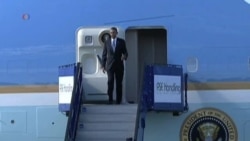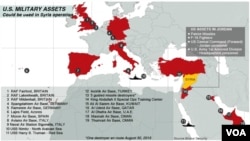WHITE HOUSE —
Many experts agree that President Barack Obama’s request for congressional approval for U.S. military action in Syria is a calculated gamble. The risk is that a “no” vote could damage the president’s political standing and U.S. international prestige.
After charges that Syria attacked its citizens with chemical weapons last month, the president is asking Congress to approve his plan for military strikes on Syria, even though many Americans oppose military action. And they are pressuring lawmakers, such as Republican Senator John McCain, who support limited strikes.
“So I want to begin by saying to you that I am unalterably opposed to having a single American boot on the ground… in Syria,” said McCain, amid hecklers and supporters at a recent town hall-style meeting on the subject.
Despite the very real possibility of legislative defeat, Obama believes congressional authorization will strengthen his hand, both at home and abroad.
"I think we will be more effective and stronger if, in fact, Congress authorizes this action," said Obama.
Seeking congressional approval also carries political risks for the president, according to Steven Heydemann at the U.S. Institute of Peace.
"But from where we stand right now, it is not at all clear whether he will prevail in Congress. And if he does not, then I think, yes, this decision to seek congressional approval will turn out to have significant consequences for the president's credibility," said Heydemann.
A “no” vote from Congress could also weaken U.S. diplomatic efforts to resolve the conflict, according to Heydemann.
"And if the U.S. loses influence, if people feel they cannot trust the president or that he cannot honor his commitments, it becomes that much harder for the U.S. to use leverage, to use influence with various actors, to try to bring this conflict to a close," he said.
Obama contends that the integrity of the United States and the international community are tied to the decision to strike Syria. That credibility could be damaged by a “no” vote, said Blaise Misztal, at Washington’s Bipartisan Policy Center.
"I think it would be a blow to the U.S.'s credibility, at this point, if, after all the pronouncements of 'red lines' and decisions to act, we were now to back down," said Misztal.
Congressional approval of his planned strikes on Syria would be widely seen as giving Obama added legitimacy. So he will take his case to the American public Tuesday, in a rare nationally-televised evening address.
After charges that Syria attacked its citizens with chemical weapons last month, the president is asking Congress to approve his plan for military strikes on Syria, even though many Americans oppose military action. And they are pressuring lawmakers, such as Republican Senator John McCain, who support limited strikes.
“So I want to begin by saying to you that I am unalterably opposed to having a single American boot on the ground… in Syria,” said McCain, amid hecklers and supporters at a recent town hall-style meeting on the subject.
Despite the very real possibility of legislative defeat, Obama believes congressional authorization will strengthen his hand, both at home and abroad.
"I think we will be more effective and stronger if, in fact, Congress authorizes this action," said Obama.
Seeking congressional approval also carries political risks for the president, according to Steven Heydemann at the U.S. Institute of Peace.
"But from where we stand right now, it is not at all clear whether he will prevail in Congress. And if he does not, then I think, yes, this decision to seek congressional approval will turn out to have significant consequences for the president's credibility," said Heydemann.
A “no” vote from Congress could also weaken U.S. diplomatic efforts to resolve the conflict, according to Heydemann.
"And if the U.S. loses influence, if people feel they cannot trust the president or that he cannot honor his commitments, it becomes that much harder for the U.S. to use leverage, to use influence with various actors, to try to bring this conflict to a close," he said.
Obama contends that the integrity of the United States and the international community are tied to the decision to strike Syria. That credibility could be damaged by a “no” vote, said Blaise Misztal, at Washington’s Bipartisan Policy Center.
"I think it would be a blow to the U.S.'s credibility, at this point, if, after all the pronouncements of 'red lines' and decisions to act, we were now to back down," said Misztal.
Congressional approval of his planned strikes on Syria would be widely seen as giving Obama added legitimacy. So he will take his case to the American public Tuesday, in a rare nationally-televised evening address.







